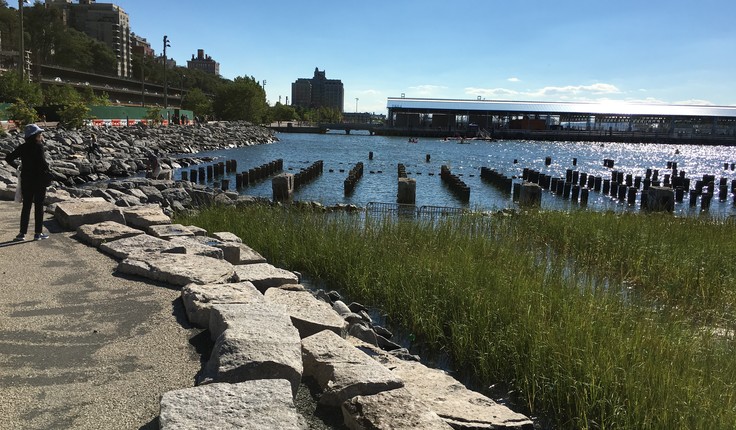News
Geography graduates, landscape assessment and using mathematics to understand landscape students
Posted 15 06 2017 by Craig Pocock
in News

Could Geography graduates be better at landscape assessment than landscape architects and how to understand landscape graduates with mathematics.
Earlier this year I wrote the article “Coffee, professional encroachment and the art of planting design.” The article subject was chosen for a range of reasons, but mainly because the NZILA had asked me to write an article on “any subject” and due to lack of personal time management skills, I was under time pressure to get the article written. Writing about planting was a “low hanging fruit” kind of article that I could do fast. The issues in my mind were clear, important and need addressing by our design community. My interest in the planting design issue stemmed from working and teaching in both the US and New Zealand and so I knew this was not just a New Zealand issue and was probably worth talking about.
While I figured I might get some flak, what I did not expect were the insightful emails responses I received, which expanded on the issues I’d outlined. Fascinatingly, in the cumulative 3000 or so words I received, not one said that I was wrong in my observations. In my experience of article writing is almost unheard of!
The responses received were from recent graduates, to some of the most experienced and significant landscape architects in the industry. I even had international responses from Landscape Architects in Australia and Ireland. I felt the responses were worth sharing so this follow up article is to share the insights of others on the issues of planting design and landscape assessment skills.
The comments received have been placed into sections to give the article structure. Not everyone who wrote a response has been included but all issues bought up in responses are covered.
The pit falls of not taking planting design seriously as a student
“When you spoke about the idolizing of the designers within our profession, and the false hopes this pins on our students and graduates; this wholeheartedly resonated with me. A student of Unitec, I remember hearing that there used to be a huge horticulture component to our degree, but it seems that over time the shift to digitalisation and its potentials has taken majority. As you said, this has resulted in our poor plant design capabilities, and let other facets such as landscape planning wane in the light of landscape architecture’s Hollywood stars. In the process we have undermined the value and possibilities of our wide variety of professionals.”
Rebecca Cray
“I read with interest your article in the NZILA newsletter on the art of Planting Design and agree with your overall viewpoint. Throughout my studies I was always surprised at the low ‘ranking’ that the planting design received in a project, and yes you are right - the plan was drawn up and ticked off the list at the end of the project most times.”
“…my first job is with a firm that does commercial landscape planting and design (emphasis on planting plans). Plants are one of my strengths and for the last 30 years as an amateur gardener I have learnt a great deal about them and that experience gives me confidence re any planting plan I do…I am a very big believer in planting making the difference in a design. So I am currently in the thick of planting design and plans every day and for now it is great learning experience in a professional role.”
Margaret Beattie
“Following an interest and focus on urban design and large scale planning throughout my education and professional career I know that plant knowledge / design can be put to one side in the early years. This is a big mistake.
I feel that one of the biggest eye openers for young landscape architects is professional embarrassment or the fear of.
Being in a room with 10 other professionals and not knowing the answer to a question in your field is a very uncomfortable situation, there are only so many times you can bluff or say you don’t know before you have to hit the books.”
Jesse O broin
We have a ‘make planting cool’ initiative in our office, not what it’s called, but it probably should be. We have established this as a key work on for our Wellington studio. We have been holding weekly lunchtime planting design sessions for a few months now. We take turns to sketch, recreate (not in plan) an existing planting design, identifying what works, what doesn’t and then sketching an alternative proposal. We will vary it up over the next few weeks and introduce some fun planting design challenges. We also recognise our responsibility to be proactive and work with the university, increasing our commitment to assist with design crits, lectures. You do get the feeling however that most 4th year students have barely spent time thinking about landscape design at a scale below 1:500.
Like Google search, I am also considering putting a ban on pinterest. This seems to be the default design tool of the new landscape grad.
Frazer Baggaley
As Jesse points out, holding onto both your job and professional credibility is not easy if you don’t have the base skills that other disciplines expect you to have. If you, as a landscape architect can’t answer questions on planting design you would have to expect, eventually, to lose your place at the table. There is only so many time you can say “I will look into it and get back to you” before others start questioning why you are at the table in the first place.
In considering this possibility, it is important to note that others at the table such as council staff, Geotech professionals and contractors may also have some plant knowledge making bluffing and risky strategy to that of simply having plant knowledge in the first place.
What I think is interesting (and not always understood) by our education providers and students, is the important role planting design plays in getting your first job. Companies don’t employment graduates for their “big picture” thinking skills, they employment them on 90% production skills and 10% can show up and do the job. The fact that a student is a “strong independent thinker” is an important bonus but not the deal maker in my experience. Planting design and production skills are the gateway to getting work experience while still a student and eventually a job as a graduate. If students are not gaining great production and planting skills they are not only at a disadvantage in finding a job but that once they have a job without these skills run the risk of being marginalise by other disciplines during collaboration as Jesse points out.
I love Frazer’s description of “making planting cool again.” Perhaps it’s time to have the industry package up how they design in 2017 and integrated these design tools into not only the education programs but our continuing professional education programs or at least compare notes!
Finally, I do wonder about the argument that I have heard “that we are creating thinkers not production designers”, in the generation of Google searching and pinterest are we really getting disciplined thinkers and researchers or “copy, paste and pinners" and is it coming at the cost to basic design and production skills? This leads onto how to understand the new graduate in the office…
The 50x2 rule- using mathematics to understand graduates
“I do have to say, that I have been extremely impressed with the design sense that recent grads have. In my experience the level of sophistication and richness in their early design thinking is far greater than I remember from my time at uni. We have had a few recent interns and grads that have been fantastic in that respect.
The challenging thing, as you have pointed out, that many just aren’t equipped to refine what is in their heads. So if I was to boil a lot of things down to one issue, it would reduce down to technical aptitude. Our profession is producing great thinkers and the majority can’t deliver. The world needs a mixture of dreamers and doers. You should start your career equipped to be both.
It’s a little like this equation:
100 x 0 = 0
50 x 2 = 100
A person with 100% creative genius with no business sense, organisation and no idea of how to deliver a concept will achieve very little.
A person with half the level of ability, with a decent understanding of how to realise an idea will achieve more.
While we expect junior staff to make mistakes, learn and develop, we all know that in professional practice we can’t afford to be babysitting junior staff. The technical aptitude of architecture and engineering students in relation to the core skill of their respective professions is far more advanced than in landscape architecture. I have always found that embarrassing.
I feel I am using (probably confusing) technical aptitude on three fronts:
Our understanding of our own profession - The landscape architecture profession appears to be obsessed with Urban Design. We feel Urban Design is creeping in on our turf and everyone wants to be part of the big conversations. We appear to be slowly forgetting what Landscape Architecture is. We need to understand and celebrate the differences. The sooner we do that the sooner we stop fighting for scraps for architects and engineers. It doesn’t help when engineers use the term literally. Calling anything made of concrete in an urban environment, urban design.
Understanding what other disciplines provide their clients - Clients want to manage their risk and exposure. As designers we need to support this by having a strong technical base, guidelines and standards to draw from. Engineers and Architects have this in spades. Having information that supports us to advocate for landscape would also be useful. What is the increase in rental return a commercial business owner could expect with the development of a well design landscape project?
The position of the landscape architect - Engineers and large construction companies have a strangle hold on the landscape profession in NZ. You have streetscapes and town centre projects, with great objectives and high aspirations, yet the first design conversation is usually about the level of service for vehicles and parking. Generally as a profession we do not appear to be leading the key design components we should be qualified to do. Our ability to sit at the table with clients, engineers and architect and fight for landscape and the people who use it, is very much related to the technical aptitude of the profession.”


Frazer Baggaley
Frazer brings up a lot of good points but my favourite is the “50x2 rule” it really resonates with me.
While at lunch a few years ago with two of my old professors after a major design critic, half way through lunch, one of them commented that they were “pleasantly” surprised that I had managed to do well professionally considered that I was hardly a star student, they both agreed. The comment took me by surprise but I took it as a compliment.
On reflection they are right, I was not top in my class nor leading the charge in critical thinking however I did understand how to get things done, how things were built not just in detail design but the process required to construct buildings and spaces, I came from a family of builders.
In my first 10 years of career I worked solo, not by choice, it was just the way it worked out in New Zealand, India and the Middle East. Without the 50x2 skill split I would not have been able to take the projects I was involved in from concept to completion, I think the 50x2 skill set was key to my professional development. The critical thinking came later as I become comfortable in the design process, gained experience through doing and become comfortable enough to question the industry norms.
I don’t think the 100x0 rule is a New Zealand construct, after working and teaching in New York, the 100x0 graduate was a problem there as well. Some of the bigger practices were leaning away from employing out of the Ivy league design schools and more towards the small local university design courses because the students had more applicable skill sets and easier to manage egos.
The 50x2 verse the 100x0 skill question is something the NZILA accreditation panel and education providers need to balance and I hope the industry supports the NZILA by providing and updating knowledge and skill sets to the education providers.
Why Geography Students maybe better Landscape assessment professionally than Landscape Architects Students.
“Thank you for your article - everything you say rings so true.
I despair at the poor level of planting design knowledge and skill or any deep interest in plants in graduate LAs and others. In some there is a lack of willingness of some to do anything about it. We spend a lot of time in house trying to upskill graduates and experienced LAs too.
And as for trying to interest students and graduates in landscape planning and assessment – an almost impossible task. Advertising for a landscape architect with landscape planning and assessment interests, skills, or experience generates few or nil suitable candidates from NZ. There are some very talented geography graduates who have both an interest in broadscale landscape and are keen to develop skills in landscape assessment.
I hope those reading your article generates some action and response.”
Boyden Evans
Boyden confirmed what I had been hearing over the last few years. Many design and planning practices around New Zealand struggle to find landscape architects that are willing to do landscape and visual assessments. I had heard of at least one firm proposing to approach the New Zealand government to add landscape architects with assessment skills on the immigration “skills shortage” list. Firms where at the time adverting as far as the United Kingdom for landscape architects with assessment skills, while ironically New Zealand graduates are looking for that magical urban design job.
What Boyden touches on, which is brilliant and scary in equal parts, is why do we think only landscape architects can do land based assessments, why could you not train up a geography student to produce high quality visual or landscape assessments, he simple answer is you could.
Boyden is clearly not suggesting that geography students would be better than landscape architects at assessment, I am sure Boyden believes that landscape architects still have the best skill set for assessment work. However, as he points out what do you do when you can’t get landscape architects interested in assessment work? You are forced to consider other options and other professional disciplines such as geography student which have a broad understanding of both the natural and cultural landscape. It is possible to conceive of training a geography graduate to do assessment work.
Landscape architecture is not a protected professional label, anyone can call themselves a landscape architect and likewise visual assessments are not protected as a professional skill set in New Zealand. Any organisation or education provider could decide to fill the gap that is clearly existing in the current market for assessment.
It may be only a question of time before another professional discipline and or associated education provider competes for this assessment skill set. Why would they not considering the work is generated by policy requirements, simple put there is a lot of it and it pays well. There is nothing to stop a geography or planning course in New Zealand adding a post graduate degree specializing in landscape and visional assessments.
I do think there is a possible opportunity for the current landscape education providers to create a more focused post graduate course on landscape assessments. I think the current problem is twofold; landscape assessment is not promoted highly at the schools as a professional direction for students to consider and comprehensive landscape assessment skills are difficult to teach in just a few courses over a degree syllabus.
It may make more sense to take the bulk of assessment out of the current landscape architecture course, only keep a basic understanding of landscape assessment and planning and then create a post graduate course specialising in landscape and visual assessment.
The post graduate course could be filled with landscape architects, planners, geography students and others. You would get those who are passionate in the assessment field and the course would be long enough to focus on developing the skill sets required for skilled assessment. It would free up more time within the typical landscape architecture degree courses by removing some landscape assessment course requirements which could be refocused towards of technical aptitude.
Landscape planning and assessment is still a cornerstone of landscape architecture and it is unwise to ignore the opportunities and contribution that such work brings. I am sure it is easier to suggest developing a post graduate course than to achieve however it would be folly to continue to ignore the current skill shortage in the market and while that hole remains in the market there is a chance someone else will fill it.
The final word
I remember attending the IFLA conference in Auckland five years ago, and listening to a keynote speaker (whose name still escapes me) who's words; “landscape architects are generalists in an age of specialisation” have stuck with me. And that's why I love Landscape Architecture! We can do anything, be involved with thousands of different projects, and see everything from the unique to the everyday places in our country.
So how then, do we form an internal culture where all the facets of our generalisation are shared and celebrated in a self-perpetuating way?
I believe we need to answer this in order to keep our title as “generalists”. It’s a matter of recapturing our professional identity before we lose critical parts (like plant design) and end up in a greater power - struggle with other professions as you've rightly pointed out. Your call to get wider industry representation at an educational level is critical. We should all be learning to celebrate the diversity of our profession and its impact on the lives of fellow New Zealanders.
Rebecca Cray
I think Rebecca summaries the issue well and the question is how do we move forward in developing and recognising the wide and unique skill sets we bring to the table. After sitting on both sides of the fence as a designer and an educator I think we all own the problem.
The design industry must understand that the education providers have limited time and budget in which to produce a landscape architect graduate with all the skills the industry requires. The education providers both in New Zealand and Internationally struggle to find experienced landscape architects with PhDs to teach into the design courses. During the education standards review I heard from the education providers that they need industry to be willing to teach into their programs, to bring their field-tested knowledge and skills into the classrooms and they need the industry to be willing to do it for below typical industry rates. We all benefit as an industry from sharing knowledge with the next generation of designers. I ran a design firm in the competitive New Zealand market and I understand the value of intellectual property however I believe that you can share and prosper and the future of Landscape Architecture in New Zealand in my mind starts with supporting our educators.
The education providers need to understand that creating great minds that can find solutions is wonderful but it can’t come at the cost of technical aptitude. The responsibility for teaching graduates basic design skills such as but not limited to planting design cannot be pasted onto the industry. We need graduates that understand, appreciative and respect all aspects of landscape architecture from design to landscape management and assessment. I have faith in the education providers and the education standards, my concern is timing, when are we going to turn these skill shortage issues around and get positive results? The longer it takes the more likely you are to getting geography students studying landscape assessment, geotech guys deciding on tree planting strategies and offshore landscape architects getting employed over New Zealand graduates. It is a slippery slope that may undermine Landscape Architecture in New Zealand.
Finally, thank you to Rebecca, Margaret, Jesse, Frazer, Boyden for allowing me to use your words and for being engaged in the NZILA community. Also, I like to thank the other Landscape architects who wrote but I did not quote, I appreciate your responses. I look forward to seeing what happens next and I promise this will be the last article I write on this subject!
Share
16 Feb
Weekly international landscape, climate and urban design update

Monday 16 February
This is your weekly international snapshot of what’s happening across landscape architecture, climate adaptation and urban design. Drawing on credible …
12 Feb
NZILA lodges submission on Planning Bill and Natural Environment Bill

There’s still time to have your say
Tuia Pito Ora New Zealand Institute of Landscape Architects has lodged its formal submission on the Planning Bill and Natural …
09 Feb
Weekly international landscape, climate and urban design update

Monday 9 February
This is your weekly international snapshot of what’s happening across landscape architecture, climate adaptation and urban design. Drawing on credible …
Events calendar
Full 2026 calendar